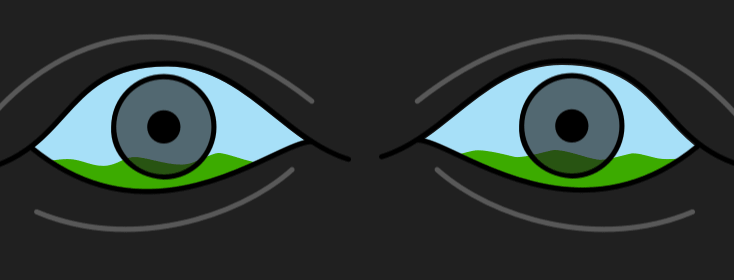What Are Flashes and Floaters?
As we age, our eyes go through many changes. Many of these changes can impact our vision. Patients with age-related macular degeneration (AMD) may be especially aware of vision changes, even if some of these symptoms
may be completely harmless. Patients with AMD may be aware of two of these symptoms, floaters and flashes. These are both common eye complaints in many people, both with and without AMD.
While floaters are almost always harmless, flashes may be a symptom of a more serious eye condition. This article will discuss some of the causes of floaters and flashes, treatments for both conditions, how they may relate to AMD, and what you should do if you have symptoms of either condition.
What are floaters?
Floaters are most commonly seen as small, thread-like lines or small fragments that appear to float through your field of vision. If you try to follow the path of a floater in your vision, it will be constantly moving and you probably won’t be able to look at them directly.1,2 While most people have floaters, many people don’t notice them until they look at a bright sky or blank piece of paper. Even still, many people learn to ignore their floaters and never even notice them until they have large or numerous floaters.2
Causes
Floaters are caused when the gel-like solution in your eye called “vitreous” begins to thin out and become watery.2 As the vitreous thins out, it begins to shrink and become stringy. These strings, which stay gel-like in texture, are what you see as floaters.1 As we get older, many of these floaters will settle in the bottom of the eye and become less pronounced.1 However, some patients find large floaters that don’t settle to be very bothersome and may find that they interfere with their sight.
Treatment
Traditionally the only way to treat persistent floaters was to remove the vitreous liquid from inside the eye and replace it with a clear, sterile fluid.2 This procedure had many risks, such as infection, retinal detachment, and causing even more floaters. Recently, there is a new treatment for floaters called “laser vitreolysis.”2 As the name implies, the treatment uses a laser to break up floaters and give patients relief. Not all floaters can be treated with laser vitreolysis. Floaters that are too close to the retina or those that don’t have soft borders are not good candidates for treatment.
Are floaters related to macular degeneration?
Most ophthalmologists do not find floaters to be related to AMD.3 If you have been diagnosed with AMD and have noticed more floaters than usual, you should contact your ophthalmologist or optometrist for an eye exam to verify that you are not experiencing another eye condition.
What are flashes?
Flashes are not as common as floaters, but they can occur. Some patients will experience squiggly flashing lines that last approximately 10-20 minutes and may or may not be accompanied by a headache.2 If a headache occurs, these lines are part of a migraine, but if they are not followed by the headache, they are referred to as an optical migraine. Flashes may also accompany a hit to the head, more commonly known as “seeing stars.”2
Causes
Most commonly flashing lights occur in the eye when the retina detaches from the eye or tears.1,2 This condition should always be treated as a medical emergency, as it can lead to permanent eye damage and loss of vision. Some retinal detachments can be caused by the vitreous shrinking and pulling away from the back of the eye (known as posterior vitreous detachment).2
Treatment
Retinal detachments and tears can usually be treated successfully, but they have to be treated soon after they happen. If you notice flashing lights in your vision you should be evaluated by an ophthalmologist, optometrist or physician as soon as possible.1,2 If you have experience flashes while your doctor’s office is closed, you may want to call their on-call or an emergency number and find out if you should seek emergency treatment.
Are they serious?
Floaters and flashes can be harmless but may be a sign of a more urgent eye condition. If you have large or persistent floaters, talk to your ophthalmologist about your symptoms. Your doctor can help you decide if you need to be treated, or if time will help. If you experience flashes in your vision, seek medical attention as soon as possible.

Join the conversation